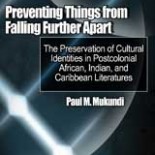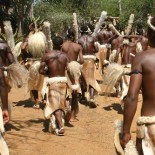SORAC African Film Festival 97
|
SORAC
|
November 18-December 5, 1997
Dickson Hall 178
November 18: 4pm-7pm
IN A TIME OF VIOLENCE (Part I, II & III)
(Brian Tilley, South Africa, 1994, 150 minutes – 3 cassettes, 50 minutes each)
Summary: Sometimes the reaction to a film can be almost as interesting as the film itself. When the first episode of In a Time of Violence aired in July, 1994, thousands of Zulu hostel dwellers, supporters of the Inkatha Freedom Party, stormed South African Broadcasting Corporation (SABC) headquarters. They threatened the cast with violence; the rival ANC reported 11 deaths related to the telecast. CCV, the arm of SABC which broadcasts specifically to the black population, banned the remaining two episodes. But, after a nation-wide protest against this capitulation to political pressure, it broadcast the entire series a week later to a record audience. In a Time of Violence is a fast paced political thriller set during the final tense months of apartheid. One of the most ambitious television dramas ever produced in South Africa, it was written by Mapantsula director Olivers Schmitz, stars some of the country’s finest actors and features a vibrant score by top Township bands. The series dramatizes the basic ANC policy of ethnic reconciliation within a multi-racial democratic society.
November 24: 1pm-2pm
MONDAY’S GIRLS
(Ngozi Onwurah, Nigeria, 1993, 50 minutes)
Summary: Monday’s Girls explores the conflict between modern individualism and traditional communities in today’s Africa through the eyes of two young Waikiriki women from the Niger delta. Although both come from leading families in the same large island town, Florence looks at the iria women’s initiation ceremony as an honor, while Azikiwe, who has lived in the city for ten years, sees it as an indignity. Ngozi Onwurah, director of such feminist classics as Coffee Coloured Children and Body Beautiful, herself an Anglo-Nigerian, turns a wry but sympathetic eye on the cross-cultural confusions.
November 24: 2pm-3pm
THESE HANDS
(Flora M’mbugu-Schelling, Tanzania, 1992, 45 minutes)
Who would have suspected that a 45 minute documentary about women crushing rocks, without narration or plot, would offer one of the most unforgettable and rewarding experiences of recent African cinema? Flora M’mbugu-Schelling’s quiet tribute to women at the very bottom of the international economic order ultimately deepens into a mediation on human labor itself. These Hands will stimulate viewers to rethink documentary and to question their own role as consumers in a global economy.
November 25: 1pm-2pm
ANGANO…ANGANO…
(Cesar Paes, Madagascar, 1989, 64 minutes)
Summary: The central character in Angano…Angano… is the oral tradition itself which passes down the wisdom of the ancestors, the “ear’s inheritance,” through myths and folktales. Venerable storytellers recount for the camera and their listeners the founding myths of Malagasy culture. The tales flow into and out of stunning shots of the daily Malagasy life which gave them life and which they in turn explain.
November 25: 2pm-3pm
FEMMES AUX YEUX OUVERTS (WOMEN WITH OPEN EYES)
(Anne-Laure Folly, Togo, 1994, 52 minutes)
Summary: Anne-Laure Folly presents portraits of contemporary African women from four West African nations: Burkina Faso, Mali, Senegal and Benin. The film shows how African women are speaking out and organizing around five key issues: marital rights, reproductive health, female genital mutilation, women’s role in the economy and political rights.
“A wonderful film seen through the eyes of women determined to make a change in their lives. It will make you cry and laugh but most importantly, bring you closer to African women.”–Else “Mia” Adjali, United Methodist Office for the U.N.
November 26: 2pm-4pm
YEELEN (BRIGHTNESS)
(Souleymane Cisse, Mali, 1987, 105 minutes)
Summary: Film Comment named Yeelen, “the best African film ever made.” Set during the powerful Mali Empire of the 13th century, it may remind viewers of 2001: A Space Odyssey. But in Cissé’s distinctly African version of “science fiction” time is circular so the future also inevitably lies in the distant past. Yeelen tells the story of Nianankoro, a young warrior, destined to destroy a corrupt older elite, the secret komo cult, and with it his father, and, necessarily, himself. The film represents a highly imaginative contemporary response to the seminal West African quest myth, The Sundjata Epic, also featured in our new release Keota.
December 1: 1pm-3pm
AFRIQUE, JE TE PLUMERAI (AFRICA, I WILL FLEECE YOU)
(Jean-Marie Teno, Cameroon, 1992, 88 minutes)
Summary: Afrique, Je Te Plumerai provides a devastating overview of one hundred years of cultural genocide in Africa. Director Jean-Marie Teno uses Cameroon, the only African country colonized by three European powers, for a carefully researched case study of the continuing damage done to traditional African societies by alien neo-colonial cultures. Unlike most historical films, Afrique, Je Te Plumerai moves from present to past, peeling away layer upon layer of cultural forgetting. Teno explains: “I wanted to trace cause and effect between an intolerable present and the colonial violence of yesterday…to understand how a country could fail to succeed as a state which was once composed of well-structured traditional societies.”
December 2: 3pm-5pm
LA VIE EST BELLE (LIFE IS ROSY)
(Ngangura Mweze, Democratic R. of the Congo (Former Zaire), 1987, 85 minutes)
Summary: La Vie est Belle takes us inside the vibrant music scene of Kinshasa, Zaire’s exhilarating and exasperating capital whose back alleys and clubs pulsate to the beat of some of the most influential music in the world. The film, starring World Beat music legend, Papa Wemba, tells the “rags to riches” story of a poor country musician who seeks fame in the city’s vibrant music industry. This lively farce illustrates Zairians’ faith in Système-D or débrouillardise, fending for yourself to survive in the face of overwhelming obstacles. If there is a commercial cinema in Africa’s future, then La Vie est Belle may be one of its precursors.
December 4: 1pm-3pm
MAPANTSULA
(Oliver Schmitz and Thomas Mogotlane, South Africa, 1988, 104 minutes)
Summary: Mapantsula (Hustler) was the first anti-apartheid feature film by, for and about black South Africans. Filmed inside Soweto, scored to the urban beat of “Township Jive,” Mapantsula has been called a South African The Harder They Come. Mapantsula tells the story of Panic, a petty gangster who inevitably becomes caught up in the growing anti-apartheid struggle and has to choose between individual gain and a united stand against the system. Mapantsula will give viewers an insider’s tour of township life and a foretaste of the vibrant popular cinema promised by the new, democratic South Africa.
December 5: 1pm-3pm
CA TWISTE A POPONGUINE (ROCKING POPENGUINE)
(Moussa Sene Absa, Senegal, 1993, 90 minutes)
Summary: Ca Twiste a Poponguine is perhaps the most charming, fast-paced and accessible film in our Library of African Cinema collection. This bittersweet, coming of age story is a kind of African equivalent of George Lucas’ American Graffiti, Spike Lee’s Crooklyn or Godard’s Masculin/Feminin. Director Moussa Sene Absa’s comedy is set during the weeks before Christmas, 1964, in a seaside village, where the local teenagers are divided into rival cultural camps. The “Ins” (or Inseparables) have adopted the names of French pop stars – Johnny Halliday, Sylvie Vartan, “Clo Clo” and Eddie Mitchell. Their clique attends school, has a female auxiliary, exchanges fervent love poetry – but they don’t own a record player. The Kings, on the other hand, style themselves after African American Rhythm and Blues legends – Otis Redding, Ray Charles and James Brown. They work as fishermen, don’t have any girls but they do have a record player.
THIS EVENT IS KINDLY SPONSORED BY THE DEAN OF CHSS. PLEASE ATTEND AND BRING YOUR STUDENTS! THE EVENT IS FREE!!
For more info, contact:
Dr. Daniel M. Mengara
French Dept.
ext. 5143



